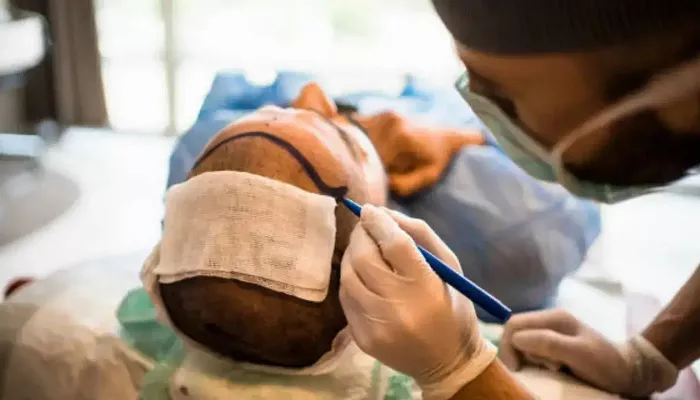Kanpur, Uttar Pradesh – Two men have died following complications from hair transplant surgeries at a private clinic in Kanpur, igniting public outrage and raising serious concerns about safety standards in cosmetic procedures.
The victims, Vineet Dubey, 40, and Mayank Katiyar, both reportedly underwent hair transplant surgery at Empire Clinic, operated by Dr. Anushka Tiwari. Within 24 hours of their respective procedures, both men succumbed to what authorities believe were severe post-operative infections.
According to police, Vineet Dubey developed intense facial swelling and excruciating pain shortly after his surgery. His wife, Jaya Tripathi, stated that Dubey’s condition deteriorated rapidly before his death on March 14. Investigators suspect the infection was introduced during the procedure and left untreated, causing fatal complications.
A similar pattern was reported in the case of Mayank Katiyar, who underwent a hair transplant late last year at the same clinic. He experienced chest pain and swelling soon after and died the following day, despite receiving treatment for pain.
Following these incidents, police filed a complaint and launched an investigation. Questions have since arisen regarding Dr. Tiwari’s qualifications, as she holds a Bachelor of Dental Surgery (BDS) degree rather than certification in dermatology or cosmetic surgery—fields required for performing hair transplant procedures under medical guidelines.
Understanding Hair Transplant Surgery and Its Risks
Hair transplant surgery is a procedure that involves moving hair follicles from a dense growth area (donor site) to a balding or thinning area of the scalp. Techniques include grafting, flap surgery, scalp reduction, and tissue expansion. While often marketed through dramatic hair transplant before and after transformations, the procedure carries risks if not performed under proper medical supervision.
Candidates for hair transplants are typically in good health, possess realistic expectations, and have healthy hair growth in donor areas. However, complications can occur, especially when the surgery is performed by unqualified personnel.
Common risks and side effects of hair transplant surgery include:
Allergic reactions to anesthesia
Excessive bleeding
Failed grafts
Scalp infections
Loss of sensation
Visible scarring
During hair transplant recovery, patients may also experience temporary side effects such as scalp tightness, severe itching, numbness, or the formation of scabs. Experts emphasize the importance of follow-up visits to monitor healing and identify signs of infection early.
When to Seek Emergency Care
Medical professionals advise patients to seek immediate attention if they develop persistent fever, uncontrolled bleeding, extreme redness or swelling, or if pus is seen oozing from the surgical site. These may indicate a serious infection requiring urgent treatment.
In the wake of the Kanpur incident, health officials have formed a special investigative panel to examine the clinic’s practices, review the qualifications of its staff, and determine how such a tragedy could have occurred.
The deaths serve as a sobering reminder that cosmetic procedures, while elective, are still medical surgeries that require strict hygiene standards and expert supervision. As demand for hair restoration grows, so too does the responsibility to ensure patient safety is never compromised.
Related topics:
- When Does Transplanted Hair Start Growing?
- Does Medicaid Cover Hair Transplant?
- How Much Does Hair Transplant Cost in India?


